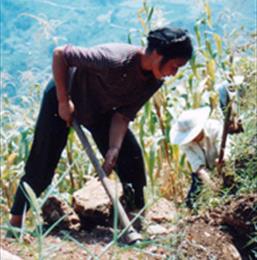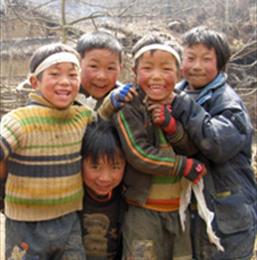Oct/Nov 2006
30th November 2006
Shiquan Village Water Supply Project
At the end of October engineer Peng Kejun from the Hanyuan Water Conservancy Bureau made a planning map for the water supply project in Shiquan, and Mr. Bai from DORS designed a plan and discussed the engineering materials and aspects for the water supply project with the village cadres. On the 7th of November DORS convened a meeting with the village group cadres in the house of the Shiquan village secretary and discussed various aspects of the drinking water project such as the time schedule, project budget, technological support, division of responsibilities, construction planning, maintenance management in a later stage, etc. We have repeatedly consulted engineer Peng and the villagers about the engineering budget and the purchase of the different kinds of materials. The project contract has already been agreed upon and signed. The project will officially start at the beginning of December and it is estimated that the project can be completed in one month.
Shiquan Village Fuel Efficient Stoves Project
At the beginning of November we discussed the fuel efficient stoves project with the villagers. We first chose 7 households to build demonstration stoves with, just like we did while implementing previous stove projects, so other villagers can get enthusiastic about the stoves. The villagers who participate in building a stove pay a contribution of 50 Yuan and pay 100 Yuan for the wages of the trainer. Villagers also put in their free labour and DORS pays for all other material. DORS also subsidizes the trainers' wages for one particularly poor household. During the implementation process of the project in this village, several villagers are trained to be the technological staff and construct the stoves, which builds a solid foundation for sustainable development for the fuel efficient stoves project in this village.
Income Generation Projects in Huodi Village
At the beginning of November, the DORS staff and Huodi villagers discussed some possible income generation projects. Previously we asked the villagers about their views on income generation, and with their actual circumstances in mind, we did research on some projects and during the discussion we proposed 9 kinds of possible development projects: raise long hair rabbits; grow Moyu; keep honeybees; plant big cherries; grow bamboo poles for growing big white butterbeans; grow bamboo shoots; cultivate medicinal herbs; grow tree fungus and women handicrafts. During the meeting the villagers expressed their preference for raising honeybees and growing medicinal herbs (which is mainly Chinese angelica). But because we are still in the pilot phase of the project, we only chose a few households to carry out the experimental project. After we discussed the criteria for selecting the households that will do the experimental projects with the villagers, villagers could voluntarily sign up their name, and all villagers would hold a voting. Then, according to the criteria, we finally selected 7 households for the experiments, from which 4 households will raise honeybees, 2 will grow medicinal herbs and 1 will cultivate Moyu. When the experimental income generation projects in Huodi village become a success, the next important step will be conducting these projects more widespread.
The Road Project in Daying Village
The Integrated Development Programme implemented by DORS in Daying village, funded by the German foundation Misereor, is nearly finished. The public road to Daying was partly funded by the Ya'an Ethnic Minority Bureau, and the villagers raised about 100 Yuan per person and would do the construction work themselves. Because of a lack of funds after the main road was constructed, the construction of the road leading to hamlet 1, 4 and 7 was suspended. The villagers of these three hamlets really want to finish this road and they hope DORS can subsidize a part of the needed funds. The villagers will raise the other part of the funds again and will provide for construction workers, so this road leading to the hamlets can be finished. After hearing the request of the Daying village leaders and the villagers, DORS explored the conditions of the entire road, checked the fund expenses on every part of the road and the subsidizing conditions of every separate unit and made sure the villagers were clear about the use of the funds. In the end DORS decided to do this road project. Right now the road construction is in process; the road to hamlet 1 is already finished and the road to hamlet 7 is almost finished. The engineering problems of the road to hamlet 4 are quite big, and more time is needed for construction, but the villagers are confident that the road will have been finished before the Spring Festival. After the road construction is finished, has been inspected and approved, DORS will pay the total fund of 30.000 Yuan to hamlets 1, 4 and 7.
The Micro-Credit Project in Chenhe Village
At the end of September and in the middle of November we received the loans from hamlets 3 and 5. The loans were paid back in two installments, this is the first time we received the repayments. An amount of in total 64.472 Yuan was paid back. The majority of the women paid back the loans according to the plan. Three women were not able to pay back the loans on time because members in their families got seriously ill, but they said that after they had sold a pig or sold the flower stalks of garlic they would be able to pay back the loans. There were sixteen women who repaid their loan in one installment and they said they would not need loans next year because they are probably able to continue developing themselves.
The Toilet Project in Shishi'er Village
In November 2005 a baseline study was conducted and on the 23rd of March 2006 the contract was signed and the project officially started. It was completed in August 2006. The total cost of the project was 3530 Yuan, the villagers contributed 400 Yuan, and DORS contributed 3130 Yuan. The village had no toilets before and this project has had a big impact on the village and improved the sanitary conditions in the village. While constructing the toilets the villagers also built the sties above the toilets, so they can raise more pigs and can also gather organic fertilizer. The fertilizer is used in agricultural production which can increase the crop output, reduce the amount of fertilizer used, save production costs and change the composition of the soil, increase food output, and may increase the villagers' income. Another possible benefit is generating more income by raising pigs. This project started after the sty construction project was completed, during which DORS provided technological guidance. After the sty project was completed there were already local villagers who knew how to lay bricks. So when the toilet project was implemented the technological aspects were no problem anymore, and the toilet walls were constructed very well. Because the villagers had an additional constructing exercise through this project, the village workers' constructing level has improved. At present the villagers can already build and repair houses themselve
DORS News and Information
On the 17th of October Rose Acock, Director of DORS, received the "International Poverty Alleviation Award" from the Sichuan Poverty Alleviation Office (PAO) in Chengdu.
On the 5th of November Wang Honghong from the Sichuan PAO was entrusted by the Sichuan PAO Director Yan Jilu to come to Hanyuan and pay DORS' staff a visit. She shared some views on DORS' 10 year celebration in April, and accompanied the DORS staff to the remote villages Huodi and Shiquan. We are very grateful to Director Yan Jilu for having supported DORS so much for so many years.
From the 15th to the 17th of November, DORS' Anne-Marie Verdel and Li Maohui attended the "The Fourth Liangshan NGO Communication Conference", sponsored by Liangshan Yi Autonomous Prefectural People's Association for Friendship with Foreign Countries.
This year DORS participated in the Sichuan Province Youth Volunteer Programme organised by the Partnership of Community Development (PCD). This Programme was developed by more than 10 organizations such as the Chengdu offices of WWF and Conservation International. DORS is one of the organisations who is granted with a subsidized volunteer to do project work at DORS from the beginning of December.


